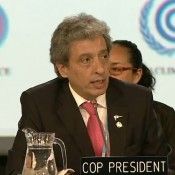COP Boss Pushes Simplified, Less Prescriptive Text In Bid To Move Climate Talks Forward
Peruvian Environment Minister Manuel Pulgar-Vidal whittled 50 pages of text down to seven on Thursday, removing all options he deemed overly prescriptive, and he did so twice: once in the morning and once at night. The first time, someone accidentally posted his proposal on the UNFCCC web site. The second time, it went up officially

11 December 2014 | LIMA| Peru | For a brief moment, Peruvian Environment Minister Manuel Pulgar-Vidal seemed to have lost his spark. As President of the 20th Conference of the Parties (COP 20) to the United Nations Framework Convention on Climate Change (UNFCCC), he’s been tirelessly shepherding delegates here towards an agreement on two issues: how best to tackle climate change between now and 2020, which is when a new climate agreement is supposed to come into effect, and sewhat should go into the building blocks of that new agreement so-called Intended Nationally-Determined Contributions (INDC).
But he looked drained and almost haggard as he introduced Kishan Kumarsingh, who heads the negotiating body charged with creating a basic text. Kumarsingh then reported that his group had failed to move beyond the 50-page document containing 36 paragraphs, almost all with several options: “In a nutshell, we have not had any progress on how we proceed with the textual negotiations on the text we completedlast night.”
Pulgar-Vidal then lit the room with a 20-minute harangue that blended into a rallying cry and culminated with him calling Kumarsingh and fellow co-chair Artur Runge-Metzger into a closed-door meeting designed to yield a simplified negotiating text a draft of which had already been accidentally posted to the UNFCCC’s web site in the morning, prompting a walkout by the G-77 and China.
Finally, at 10:30pm local time, he posted a new negotiating text that boiled 50 pages of bloated text offering several options for each paragraph down to seven pages comprised of 17 paragraphs, only four of which had options. Each of those four has only three options, and each of those three is clearly delineated from the others.
The new text is decidedly less prescriptive than the earlier one. On land use, for example, the previous text contained several detailed options for making land-use provisions explicit and calling for meetings between now and Paris. The new text has just one option in the main body that explicitly mentions land-use (the third option under paragraph nine, which asks countries to detail their “land-use accounting approaches and expected use of market mechanisms, undertakings in national adaptation planning processes, and if applicable, the provision of finance, technology development and transfer and capacity-building support for ambitious mitigation and adaptation action in developing countries.”)
The annex, which contains the proposed elements of a country’s Intended Nationally-Determined Contribution, has also been whittled from 15 pages to two, and makes a brief reference to the need for “accounting for the land sector, including an explanation of how Parties will address all significant lands or activities, pools and gases; the reason for exclusion of any significant lands or activities, pools and gases; the approach proposed for addressing non-anthropogenic impacts, if any; and whether any accounting approaches build upon existing and agreed guidance or other methodologies.”
The result is a document with no one’s pet projects delineated explicitly, but none explicitly endorsed, either.
“Don’t leave me alone.
Work with me together, based on confidence, to deal with the problem.
Pular-Vidal drew a standing ovation for his appeal to put legalistic thinking aside and focus on core values.
“This isn’t a linguistic discussion,” he said. “It’s a substantial discussion.”
He conceded the need for negotiators to look out for their own national interests, but urged them to cooperate.
“The solution is not in the words, not in the dots or points, but in the substance,” he said, recounting his 28 years in environmental law. “You are my colleagues. Most of you are ministers of environment; some of you are ministers of foreign affairs; and I’m sure we believe in the same thing. Obviously we recognize your domestic needs, your domestic problems, your internal political difficulties.
“Don’t leave me alone,” he concluded. “Work with me together, based on confidence, to deal with the problem.”
In the morning, we’ll see how well the appeal worked.
Please see our Reprint Guidelines for details on republishing our articles.

